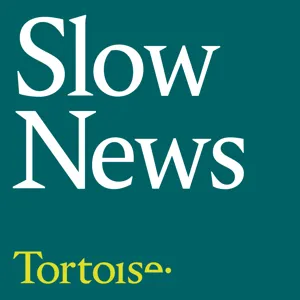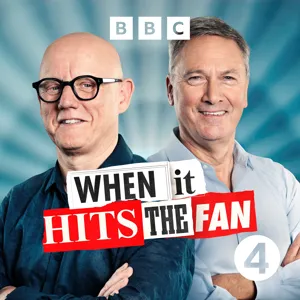Podcast Summary
Exploring LinkedIn's Value for Small Businesses and the UK National Lottery's Impact: LinkedIn provides small businesses access to a vast talent pool, while the UK National Lottery generates profits for public causes, despite long odds of winning.
LinkedIn is an essential platform for small businesses looking to hire professionals. It offers access to a large pool of potential candidates, many of whom may not be actively seeking new jobs but could be open to the right opportunity. Additionally, the Connect Effect platform can help businesses make informed decisions with industrial intelligence, enabling collaboration, innovation, and growth. Elsewhere, the UK National Lottery, launched over 25 years ago, has become a significant public contract due to its ability to generate substantial profits and fund various causes, despite the long odds of winning. The lottery's impact on charities, arts, heritage, community projects, and sports has been substantial, making it a controversial yet attractive opportunity for operators.
UK National Lottery license selection controversy: Transparency and robust regulation are crucial in corporate competitions, especially those involving significant public contracts, to prevent concerns over rule changes, lack of scrutiny, and potential influence.
The process of awarding the National Lottery license in the UK in 2018 was questionable, with concerns over potential last-minute rule changes, lack of proper scrutiny, and connections between the winning company and Russia. The winning bid by Orwin, a Czech company owned by billionaire Karel Komarek, raised eyebrows due to his links to Russian contracts and the suddenness of his selection. The government's push for a new operator and the regulator's seemingly lenient approach to the competition raised concerns about the rule of law and influence in the system. This story highlights the importance of transparency and robust regulation in corporate competitions, especially those involving significant public contracts.
Unexpected twists in business deals in post-Soviet countries: Thorough due diligence is crucial when doing business in transitional economies to avoid unexpected complications and potential risks associated with opaque business structures.
Business deals in post-Soviet countries can be fraught with unexpected twists and turns, as evidenced by the experience of British oil company Ramco and the Komarek family in the Czech Republic. In the early 1990s, Ramco was working with the state-owned Czech Energy Company to explore for oil and gas. However, when they discovered resources, the company they were dealing with suddenly changed hands, and Ramco found themselves being expelled from the project. Ramco hired a private intelligence firm, Hacklett, to investigate the Komareks, and the report they produced contained serious allegations of questionable business dealings. Despite the report being meant for internal use only, a copy ended up in the hands of the Komareks, leading to further complications. This incident underscores the importance of thorough due diligence when doing business in transitional economies and the potential risks of dealing with opaque business structures.
Misaddressed Report Leads to High-Profile Libel Lawsuit Against Ramko: Inaccuracies and oversights can have serious consequences, but the allure of potential big wins keeps people playing lotteries despite long odds.
Even in the business world, mistakes can lead to significant consequences. In this case, a misaddressed report led to a high-profile libel lawsuit against Ramko. The allegations made in the report were never proven in court, but the damage to the Komareks' reputation was done. Despite this setback, Karel Komarek continued to expand his business ventures, including buying the Czech lottery company and later bidding to run the UK's national lottery. Meanwhile, the lottery itself has undergone significant changes since its inception, with the introduction of instant wins and an increase in ticket prices. People continue to play despite the long odds, drawn in by the potential for a life-changing jackpot. Professor Mark Griffith, an expert in probability theory and gambling addiction, explains that people tend to focus on the potential win rather than the odds of losing. While he has not encountered gambling addiction related to draw-based games like the lottery, he has seen issues with scratch cards and instant wins. Overall, this story highlights the importance of accuracy and attention to detail, as well as the allure of the potential for a big win, even against long odds.
NAO Report Highlights Shift in Lottery Revenues towards Scratchcards and Instant Wins: The NAO report revealed that less money was going to good causes due to the rise in popularity of scratchcards and instant win games, resulting in a decline in funds from traditional draw-based games like Lotto and EuroMillions.
The National Lottery operator, Camelot, has been under scrutiny for its increasing reliance on scratchcards and instant win games, which contribute less to good causes compared to traditional draw-based games like Lotto and EuroMillions. The National Audit Office (NAO) reported that more money was going to shareholder profits instead of good causes due to the shift in player behavior towards these types of games. The sales of scratchcards rose while those of draw-based games declined, resulting in a drop in funds for good causes. This trend emerged during a period when Camelot was owned by the Ontario Teachers' Pension Plan. The NAO report was published in late 2017, and less than a year later, the gambling commission began the 4th license competition process. It's essential to understand that not all lottery funds are created equal, and the choice of game can significantly impact the amount that goes towards good causes.
Intense Scrutiny on UK's National Lottery Bidders' Commitment to Good Causes: During the bidding process for the UK's National Lottery license, Alwyn proposed raising more funds for good causes than Camelot, but concerns about their business interests in Russia led to investigations and requests for assurances.
The UK's National Lottery license, worth over £6.5 billion, is subject to intense scrutiny regarding the bidders' commitment to good causes. During the bidding process for the 4th license in 2020, only two contenders, Alwyn and Camelot, advanced to the next stage. Leaked documents revealed that Alwyn proposed raising significantly more funds for good causes than Camelot. However, just before the Gambling Commission announced Alwyn as the winner, Russia invaded Ukraine, raising concerns about Alwyn's business interests in Russia. The Gambling Commission and the DCMS committee requested assurances that proper checks had been conducted on Alwyn's relationship with Russia and that they had divested from any Russian contracts due to the ongoing sanctions. The invasion also led to renewed scrutiny of Hacklet, the private investigations company, as they were approached to investigate Alwyn but declined, citing concerns about their previous involvement with the company.
Challenges in removing Russian influence from infrastructure projects: Thorough due diligence and transparency in the bidding process are crucial to mitigate risks and ensure compliance with regulatory requirements.
The process of removing Russian influence from key infrastructure projects, such as the Czech National Infrastructure gas facility, is not as straightforward as it seems. The case of Orlin Group, formerly Saskia Group, and their joint venture with Gazprom in the Czech Republic's Moravia region, highlights the challenges in ensuring compliance with sanctions and the importance of transparency in the bidding process. Although Orlin Group announced their preferred bidder, Alwyn, in March 2022, the completion of the process is uncertain. Orlin Group had been in discussions to remove Gazprom from the joint venture, but progress has been slow, with no evidence of divestment or regulatory approval. The plan to sell Orlin's share to the Czech government seems to have been shelved, and a new plan for Gazprom to dilute its shareholding to 3% is still in the works. The situation calls into question the reassurances given to the Gambling Commission regarding the bidders' compliance with sanctions. The lack of transparency and the reliance on future actions to ensure compliance raises concerns about the effectiveness of the checks and balances in place for issuing contracts. The situation underscores the importance of thorough due diligence and transparency in the bidding process to mitigate risks and ensure compliance with regulatory requirements.
Komarek's Russian business ties raise concerns in National Lottery license award: The Gambling Commission's due diligence process for awarding the National Lottery license to Karel Komarek failed to uncover his previous ownership of a Russian oil terminal, raising questions about transparency and potential conflicts of interest.
The Gambling Commission's due diligence process for awarding the National Lottery license to Karel Komarek raised concerns due to his business interests in Russia. The Commission only asked bidders if they were impacted by sanctions on Russia, but Komarek had previously owned a Russian oil terminal through his parent company. After winning the license, two of his most senior employees remained on the oil terminal's board until they transferred control to a Czech company owned by another senior employee just months later. The Commission maintains that they ran a fair competition, but the timing and transfer of ownership raise questions about transparency and potential conflicts of interest. Additionally, Komarek's confirmation of the divestment came after the fact, and his parent company's openness about their Russian investments does not address the issue of the timing and transfer of ownership. Overall, the situation highlights the importance of thorough and transparent due diligence processes in ensuring the integrity of licensing and bidding processes.
Britain's National Lottery: Controversial Decision to Award License to Alwyn: The Gambling Commission's sudden change in the application scoring system led to controversy in the awarding of Britain's National Lottery license to Alwyn over Camelot, despite Alwyn's Russian connections and questionable influence tactics.
The National Lottery competition in Britain, worth over £2 billion, was mired in controversy due to the Gambling Commission's decision to award the license to Alwyn, a company with Russian connections, over Camelot, the incumbent. Alwyn's Anglicized name, paid media coverage, and high-profile advisors may have influenced the decision. However, the most significant issue was the Gambling Commission's sudden change in the application scoring system, which eliminated the transition risk factor that favored Camelot. This change occurred just before Alwyn was announced as the winner. The controversy deepened when Camelot sued the Gambling Commission for wrongful evaluation of the bids and the case was sealed shut after Orlin, a rival company, bought Camelot. The implications of these events raise concerns about the transparency and fairness of the procurement process.
Leaked document raises questions about National Lottery operator's transparency and fulfillment of promises: A leaked document revealed potential issues with the National Lottery operator's transparency and ability to meet promises, including adjusting risk levels and unfulfilled commitments to divest from certain businesses.
The National Lottery, worth £6.5 billion and a public contract running for a decade, has raised questions about transparency and fulfillment of promises made by the winning operator, Alwyn or Camelot. A leaked document revealed that adjusting the risk level led to a change in the previous order, potentially impacting the company's ability to meet its pledge of raising over 18 billion for good causes. Additionally, unfulfilled promises such as Karel Komarek's divestment from a Gazprom joint venture and the control of an oil terminal in Samara by his parent company remain unanswered. The gambling commission's assessment of a seamless transition to a new operator also came into question as Alwyn announced a transition period of two years. These issues highlight the importance of transparency and accountability in the awarding and execution of such significant public contracts.






